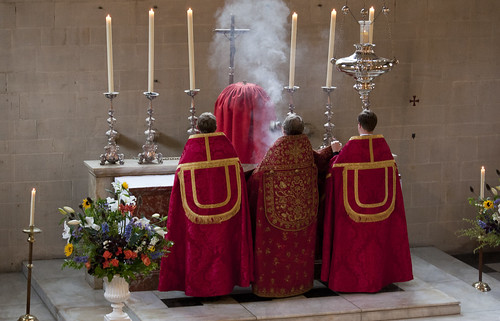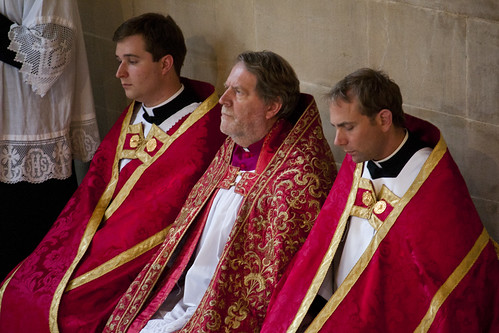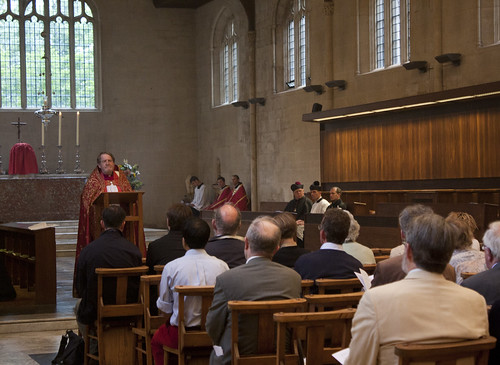by Br Lawrence Lew, O.P.

On 15 June 2011, six months after the Personal Ordinariate of Our Lady of Walsingham was established in England and Wales, their first Ordinariate liturgical celebration was held in the Dominican priory church of the Holy Spirit (Blackfriars) in Oxford. The celebrant and preacher was Mgr Andrew Burnham, assisted by the deacons James Bradley and David Elliott. The Precentor was the Ordinariate deacon local to Oxford, Daniel Lloyd.
The Anglican Use liturgy alluded to by Anglicanorum coetibus is still in a state of flux, it seems, and approval for a final redaction of the Use is still awaited from Rome. However, there is The Book of Divine Worship, authorized by the Holy See in 1983 for the Pastoral Use Parishes in North America. This book, it seems, is to be revised, but remains in force as a legitimate liturgical text, and until the Anglican Use liturgy is approved by Rome and published, the Ordinariate in England and Wales may have recourse to The Book of Divine Worship.
As such, what we experienced in Oxford yesterday included elements from this book while respecting the shape and rubrical demands of the General Instruction of the Roman Rite Divine Office, published in 1974. As Mgr Burnham observed in his Foreword to the service booklet: "We have come as close as we can, we feel, to what is encouraged and permitted by the Roman Rite. The resulting liturgy was what Mgr Burnham called "a votive Office of the Holy Spirit in Week 11 of Ordinary time", which was appropriate given the dedication of the priory church. This votive Office, he wrote, "has distinct affinity with what the office on the Wednesday of the Pentecost Octave might feel like - and that particular configuration is one which might yet be made possible by an Anglican Use Calendar". Mgr Burnham also mentioned the "liturgical genius of Thomas Cranmer" in combining the Offices of Vespers and Compline, and so, Evensong, which he said "is a celebration of the Office which has long been envied by Catholics... is now, we think, thanks to the Ordinariate, available within the Catholic Church".
Music, of course, is an important part of Evensong, and the choir directed by Alistair Reid, with Richard Moore on the organ, offered a musical feast drawn from the Anglican patrimony. In his homily, which will be available on the Ordinariate's website soon, Mgr Burnham spoke again of the distinctive contribution which the Ordinariate could bring to the Catholic Church, particularly in the liturgy, and the music we heard last evening was evidence of this. The beauty of yesterday's Evensong and Benediction, which was almost entirely sung in the vernacular, and executed with precise and reverent but unfussy ceremonial was most encouraging, and seemed to me to lead the way in a reform of the Reform. To Evensong was added the extra-liturgical devotion of Benediction, and together, Mgr Burnham said, these constituted "a missionary tool of immense potential". By the grace of the Holy Spirit, may it be so.





More photos in the complete Flickr set here.
The Anglican Use liturgy alluded to by Anglicanorum coetibus is still in a state of flux, it seems, and approval for a final redaction of the Use is still awaited from Rome. However, there is The Book of Divine Worship, authorized by the Holy See in 1983 for the Pastoral Use Parishes in North America. This book, it seems, is to be revised, but remains in force as a legitimate liturgical text, and until the Anglican Use liturgy is approved by Rome and published, the Ordinariate in England and Wales may have recourse to The Book of Divine Worship.
As such, what we experienced in Oxford yesterday included elements from this book while respecting the shape and rubrical demands of the General Instruction of the Roman Rite Divine Office, published in 1974. As Mgr Burnham observed in his Foreword to the service booklet: "We have come as close as we can, we feel, to what is encouraged and permitted by the Roman Rite. The resulting liturgy was what Mgr Burnham called "a votive Office of the Holy Spirit in Week 11 of Ordinary time", which was appropriate given the dedication of the priory church. This votive Office, he wrote, "has distinct affinity with what the office on the Wednesday of the Pentecost Octave might feel like - and that particular configuration is one which might yet be made possible by an Anglican Use Calendar". Mgr Burnham also mentioned the "liturgical genius of Thomas Cranmer" in combining the Offices of Vespers and Compline, and so, Evensong, which he said "is a celebration of the Office which has long been envied by Catholics... is now, we think, thanks to the Ordinariate, available within the Catholic Church".
Music, of course, is an important part of Evensong, and the choir directed by Alistair Reid, with Richard Moore on the organ, offered a musical feast drawn from the Anglican patrimony. In his homily, which will be available on the Ordinariate's website soon, Mgr Burnham spoke again of the distinctive contribution which the Ordinariate could bring to the Catholic Church, particularly in the liturgy, and the music we heard last evening was evidence of this. The beauty of yesterday's Evensong and Benediction, which was almost entirely sung in the vernacular, and executed with precise and reverent but unfussy ceremonial was most encouraging, and seemed to me to lead the way in a reform of the Reform. To Evensong was added the extra-liturgical devotion of Benediction, and together, Mgr Burnham said, these constituted "a missionary tool of immense potential". By the grace of the Holy Spirit, may it be so.





More photos in the complete Flickr set here.

 inundado por um mistério de luz que é Deus e N´Ele vi e ouvi -A ponta da lança como chama que se desprende, toca o eixo da terra, – Ela estremece: montanhas, cidades, vilas e aldeias com os seus moradores são sepultados. - O mar, os rios e as nuvens saem dos seus limites, transbordam, inundam e arrastam consigo num redemoinho, moradias e gente em número que não se pode contar , é a purificação do mundo pelo pecado em que se mergulha. - O ódio, a ambição provocam a guerra destruidora! - Depois senti no palpitar acelerado do coração e no meu espírito o eco duma voz suave que dizia: – No tempo, uma só Fé, um só Batismo, uma só Igreja, Santa, Católica, Apostólica: - Na eternidade, o Céu!
inundado por um mistério de luz que é Deus e N´Ele vi e ouvi -A ponta da lança como chama que se desprende, toca o eixo da terra, – Ela estremece: montanhas, cidades, vilas e aldeias com os seus moradores são sepultados. - O mar, os rios e as nuvens saem dos seus limites, transbordam, inundam e arrastam consigo num redemoinho, moradias e gente em número que não se pode contar , é a purificação do mundo pelo pecado em que se mergulha. - O ódio, a ambição provocam a guerra destruidora! - Depois senti no palpitar acelerado do coração e no meu espírito o eco duma voz suave que dizia: – No tempo, uma só Fé, um só Batismo, uma só Igreja, Santa, Católica, Apostólica: - Na eternidade, o Céu!